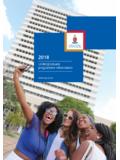Transcription of and CENTRE FOR APPLIED LEGAL STUDIES First …
1 CONSTITUTIONAL COURT OF SOUTH AFRICA. Case CCT 54/06. [2007] ZACC 9. FANUEL SITAKENI MASIYA Applicant versus DIRECTOR OF PUBLIC PROSECUTIONS. ( pretoria ) First Respondent MINISTER OF JUSTICE AND CONSTITUTIONAL. DEVELOPMENT Second Respondent and CENTRE FOR APPLIED LEGAL STUDIES First Amicus Curiae TSHWARANANG LEGAL ADVOCACY. CENTRE Second Amicus Curiae Heard on : 9 November 2006. Decided on : 10 May 2007. JUDGMENT. NKABINDE J: [1] This case is about the constitutional validity of the common law definition of rape to the extent that it excludes anal penetration and is gender-specific. The case concerns the manner in which the definition of rape has been understood, developed and interpreted in South African law. The definition has been debated by the courts, NKABINDE J. Legislature and civil society over the years. Essentially, this matter comes before this Court on two bases. First , confirmation proceedings in terms of section 172(2)(a)1 of the Constitution. Second, an application for leave to appeal2 against the whole of the judgment and order of the pretoria High Court3 in which that Court confirmed the applicant's conviction by the Regional [2] The full terms of the order against which leave to appeal is sought read as follows: 1.
2 The common law definition of rape is declared to be unconstitutional as it currently stands, for the reasons given by the learned Magistrate in his judgment and for the further reasons set out in this judgment. 2. The definition of rape is extended to include acts of non-consensual sexual penetration of the male penis into the vagina or anus of another person. 3. The provisions of Act 105 of 1997 and its schedules and Section 261(1)(e). and (f) and (2)(c) of the Criminal Procedure Act 51 of 1977 and the schedules to the latter Act relating to bail provisions are declared to be invalid and are inconsistent with the Constitution to the extent that they are gender specific. 1. Section 172(2)(a) provides: The Supreme Court of Appeal, a High Court or a court of similar status may make an order concerning the constitutional validity of an Act of Parliament, a provincial Act or any conduct of the President, but an order of constitutional invalidity has no force unless it is confirmed by the Constitutional Court.
3 See also section 167(5) of the Constitution which provides: The Constitutional Court makes the final decision whether an Act of Parliament, a provincial Act or conduct of the President is constitutional, and must confirm any order of invalidity made by the Supreme Court of Appeal, a High Court, or a court of similar status, before that order has any force.. 2. In terms of section 172(2)(d) of the Constitution. The section reads: Any person .. with a sufficient interest may appeal, or apply, directly to the Constitutional Court to confirm or vary an order of constitutional invalidity by a court in terms of this subsection.. 3. S v Masiya 2006 (11) BCLR 1377 (T); 2006 (2) SACR 357 (T). 4. S v Masiya case no SHG 94/04 11 July 2005, unreported. 2. NKABINDE J. 4. Where the provisions referred to in (3) above are gender specific there be a reading in of person' wherever reference is made to a specific gender. 5. The proceedings in the Court a quo are determined to be in accordance with justice in terms of the provisions of Section 52 of Act 105/1997.
4 6. Sentencing of the accused is postponed until the Constitutional Court has made a determination on the order of Constitutional invalidity referred to in (3) of this order.. [3] As apparent from paragraphs 1 and 3 of the order, the declarations of invalidity relate to whether the definition of rape is constitutionally invalid and whether the specified provisions of the Criminal Procedure Act 1977 (the CPA)5 and of the Criminal Law Amendment Act 1997 (the Act)6 and their relevant Schedules are inconsistent with the Constitution to the extent that they are gender-specific. [4] The applicant, Mr Masiya, is an awaiting-sentence prisoner. The First respondent is the Director of Public Prosecutions (DPP). The second respondent is the Minister of Justice and Constitutional Development (Minister). She has been joined as a party to the proceedings by reason of her being the national executive authority responsible for the administration of justice. The First and second amici curiae, the CENTRE for APPLIED LEGAL STUDIES and Tshwaranang LEGAL Advocacy CENTRE (amici), respectively, have been admitted to assist the Court.
5 Background 5. Act 51 of 1977. 6. Act 105 of 1997. 3. NKABINDE J. [5] The facts appear from the judgment of the High Court. I restate only the relevant facts to make the discussion in this judgment comprehensible. [6] Mr Masiya, 44 years of age, was initially brought before the District Court at Sabie on a charge of rape. The state alleged that on or about 16 March 2004 at or near Sabie he wrongfully and unlawfully had sexual intercourse with a nine-year old girl (the complainant), without her consent. The case was transferred to the Regional Court at Graskop where he was tried on that charge. At the trial Mr Masiya, represented by an attorney from the Nelspruit Justice CENTRE , pleaded not guilty. He elected to remain silent and did not advance a statement explaining his plea. The evidence established that the complainant was penetrated anally. [7] Mr Masiya neither gave evidence nor called witnesses to testify. The state APPLIED that he be convicted of indecent assault, a competent verdict on a charge of The defence contended that if Mr Masiya were to be found guilty he should be convicted of indecent assault.
6 [8] The Regional Court, of its own accord, considered whether the common law needed to be developed. The defence contended that Magistrates' Courts do not have the power to pronounce on the constitutionality of a rule of the common law. The 7. Section 261 of the CPA provides: (1) If the evidence on a charge of rape or attempted rape does not prove the offence of rape or, as the case may be, attempted rape, but .. (b) the offence of indecent assault;.. the accused may be found guilty of the offence so proved.. 4. NKABINDE J. Regional Court remarked that the court, albeit a creature of statute, has jurisdiction in terms of the Constitution to judge the constitutionality of a LEGAL principle under common law and, if necessary to develop the principle so that it conforms with the constitutional values enshrined in our Constitution .8 The Court remarked that there is nothing in the Constitution or other legislation that precludes it from enquiring into or ruling on the constitutionality of a rule of the common law and developing it where necessary.
7 It pointed out that sections 8(3)9 and 39(2)10 of the Constitution speak, respectively, of a court and every court, tribunal or forum . [9] The Regional Court remarked further that . [I]n terms of the existing common law definitions of crime, the non-consensual anal penetration of a girl (or a boy) amounts only to the (lesser) common law crime of indecent assault, and not rape, because only non-consensual vaginal sexual intercourse is regarded as rape. One's initial feelings of righteousness would however immediately rebel against such thought. Why must the unconsensual sexual penetration of a girl (or a boy) per anum be regarded as less injurious, less humiliating and less serious than the unconsensual sexual penetration of a girl per vaginam? The distinction appears on face value to be irrational and totally senseless, because the anal orifice is no less private, no less subject to injury and abuse, and its sexual penetration no less humiliating than the vaginal orifice.
8 It therefore appears 8. Above n 4 at para 43. 9. Section 8(3) provides: When applying a provision of the Bill of Rights to a natural or juristic person in terms of subsection (2), a court . (a) in order to give effect to a right in the Bill of Rights, must apply, or if necessary develop, the common law to the extent that legislation does not give effect to that right; and (b) may develop rules of common law to limit the right, provided that the limitation is in accordance with section 36(1).. 10. Section 39(2) provides: When interpreting any legislation, and when developing the common law or customary law, every court, tribunal or forum must promote the spirit, purport and objects of the Bill of Rights.. 5. NKABINDE J. that the common law definition of rape is not only archaic, but irrational and amounts to arbitrary discrimination with reference to which kind of sexual penetration is to be regarded as the most serious, and then only in respect of women. 11 (Footnote omitted.)
9 [10] The Regional Court held that the definition should be developed to promote constitutional objectives, and that courts may develop the current definition of rape given Parliament's lengthy delay in promulgating the Criminal Law (Sexual Offences). Amendment Bill of 2003 (the 2003 Bill)12 so as to afford society the full protection of the Constitution. The Court held that although the development would impact on Mr Masiya's fair trial rights in terms of section 35(3)(n)13 of the Constitution those fair trial rights could be limited on the basis that . (a) non-consensual anal penetration already constitutes an offence, namely indecent assault, and is manifestly immoral and unjust;. (b) retroactive punishment could have been foreseen by Mr Masiya;. (c) such development will be consistent with foreign law;. (d) the rights of society are weightier than those of Mr Masiya not to be convicted of and sentenced to a more serious offence;. (e) less restrictive means to achieve the purpose sought to be achieved by the extension of the definition of rape would have been for Parliament to address the lacuna with an appropriate law, but Parliament has dragged its feet; and 11.
10 Above n 4 at para 17. 12. Bill B50-2003. 13. Section 35(3)(n) provides: Every accused person has a right to a fair trial, which includes the right .. to the benefit of the least severe of the prescribed punishments if the prescribed punishment for the offence has been changed between the time that the offence was committed and the time of sentencing . 6. NKABINDE J. (f) the developed definition would become law of general application if endorsed by the High Court upon referral. [11] The Regional Court thus extended the definition of rape to include .. acts of non-consensual sexual penetration of the male sexual organ into the vagina or anus of another person .14. It expressly refrained from ruling on whether non-consensual oral penetration should constitute the crime of rape as that was not an issue in the proceedings. Having convicted Mr Masiya of rape in terms of the extended definition, the Regional Court stopped the proceedings and committed him to the High Court in terms of section 5215.

















